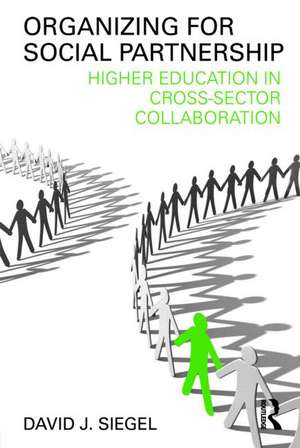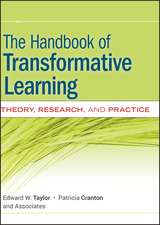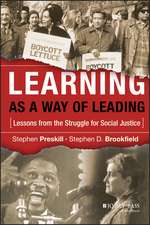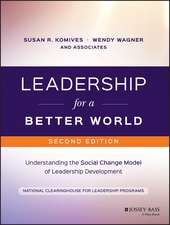Organizing for Social Partnership: Higher Education in Cross-Sector Collaboration
Autor David J. Siegelen Limba Engleză Paperback – 24 mar 2010
| Toate formatele și edițiile | Preț | Express |
|---|---|---|
| Paperback (1) | 427.96 lei 6-8 săpt. | |
| Taylor & Francis – 24 mar 2010 | 427.96 lei 6-8 săpt. | |
| Hardback (1) | 1090.69 lei 6-8 săpt. | |
| Taylor & Francis – 24 mar 2010 | 1090.69 lei 6-8 săpt. |
Preț: 427.96 lei
Nou
Puncte Express: 642
Preț estimativ în valută:
81.93€ • 85.16$ • 67.93£
81.93€ • 85.16$ • 67.93£
Carte tipărită la comandă
Livrare economică 06-20 februarie 25
Preluare comenzi: 021 569.72.76
Specificații
ISBN-13: 9780415994996
ISBN-10: 0415994993
Pagini: 224
Ilustrații: 2 tables
Dimensiuni: 152 x 229 x 18 mm
Greutate: 0.32 kg
Ediția:1
Editura: Taylor & Francis
Colecția Routledge
Locul publicării:Oxford, United Kingdom
ISBN-10: 0415994993
Pagini: 224
Ilustrații: 2 tables
Dimensiuni: 152 x 229 x 18 mm
Greutate: 0.32 kg
Ediția:1
Editura: Taylor & Francis
Colecția Routledge
Locul publicării:Oxford, United Kingdom
Cuprins
Introduction
I. Framing the Challenge
1. Social Issues in a Boundaryless World
2. The Engagement Imperative in American Higher Education
3. The Promise of Intersectoral Collaboration
II. A Model for Addressing the Social Problem of Underrepresentation
4. Case Example: Building the Diversity Pipeline
5. Starting Conditions: Rationales for Interorganizational Collaboration
6. The Experience of Collaboration
7. The Difference Made by Partnership
III. The Future of Social Partnership
8. Organizations as Activists
9. Implications for Organizations and Society
I. Framing the Challenge
1. Social Issues in a Boundaryless World
2. The Engagement Imperative in American Higher Education
3. The Promise of Intersectoral Collaboration
II. A Model for Addressing the Social Problem of Underrepresentation
4. Case Example: Building the Diversity Pipeline
5. Starting Conditions: Rationales for Interorganizational Collaboration
6. The Experience of Collaboration
7. The Difference Made by Partnership
III. The Future of Social Partnership
8. Organizations as Activists
9. Implications for Organizations and Society
Recenzii
"[This book] provides the reader with a stimulating framework to rethink organizations for a fairer world. As such, it is of huge interest both for faculties and practitioners working on diversity and social justice as well as for researchers interested in organizational studies."--Teachers College Record
"Organizing for Social Partnership: Higher Education in Cross-sector Collaboration significantly contributed to the discussion of increasing diversity in the workplace by presenting why diversity is needed, how to form cross-sector partnerships, and suggestions for further social partnerships."—Education Review
"In addition to its multiple virtues as a methodologically sound, theoretically well-grounded, and meticulously researched project, Siegel’s book is simply enjoyable reading. The wealth of the observational, interview, and document data gathered for this case study is an inexhaustible source of stories and metaphors that enliven and elucidate the discussion."—Journal of College Student Development
"Organizing for Social Partnership: Higher Education in Cross-sector Collaboration significantly contributed to the discussion of increasing diversity in the workplace by presenting why diversity is needed, how to form cross-sector partnerships, and suggestions for further social partnerships."—Education Review
"In addition to its multiple virtues as a methodologically sound, theoretically well-grounded, and meticulously researched project, Siegel’s book is simply enjoyable reading. The wealth of the observational, interview, and document data gathered for this case study is an inexhaustible source of stories and metaphors that enliven and elucidate the discussion."—Journal of College Student Development
Notă biografică
David J. Siegel is Associate Professor in the Department of Educational Leadership at East Carolina University.
Descriere
Organizing for Social Partnership offers a model and a strategy for universities, corporations, government agencies, nonprofits, and other organizations interested in engaging in social partnerships. This mode of collaboration provides a potentially powerful arrangement for addressing large-scale social issues of interest to higher education and other sectors.














